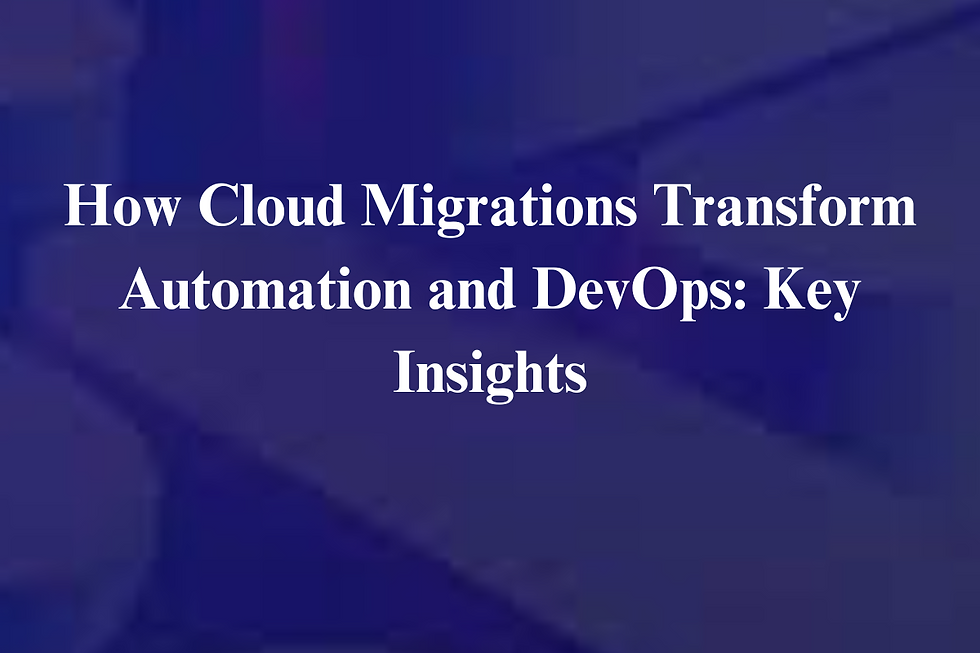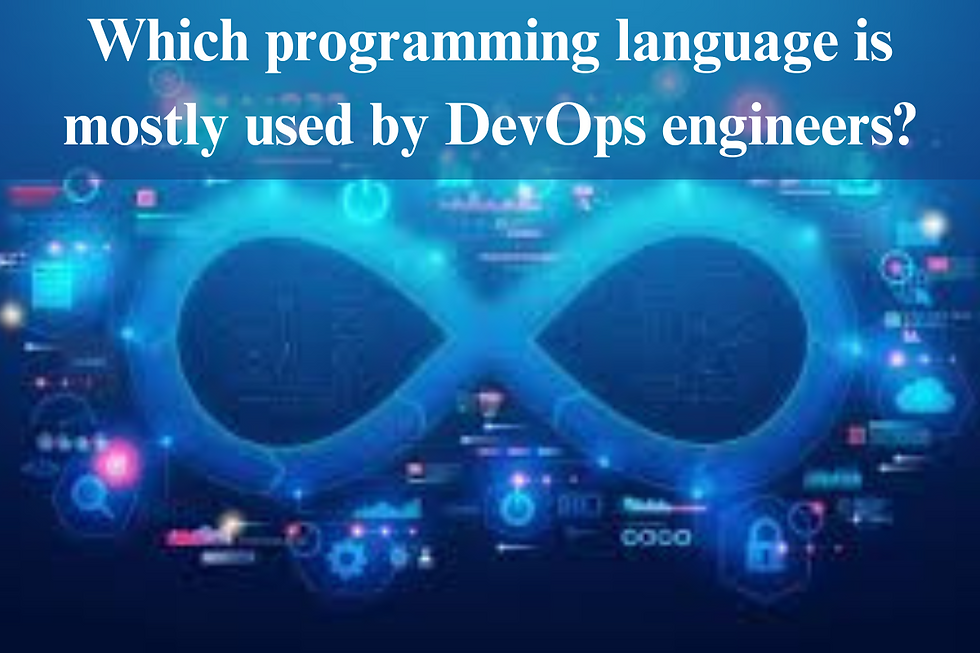How Cloud Migrations Transform Automation and DevOps: Key Insights
- kanika chauhan

- Sep 4, 2024
- 4 min read

The rapid evolution of cloud computing has revolutionized how businesses operate, enabling greater scalability, flexibility, and cost-efficiency. Among the myriad benefits that cloud migrations offer, the profound impact on automation and DevOps practices stands out. As organizations increasingly shift to the cloud, understanding how this transformation affects DevOps and automation is crucial for anyone involved in IT, software development, or business strategy.
The Rise of Cloud Migrations
Cloud migrations involve moving data, applications, and IT processes from on-premises infrastructure to a cloud environment. This transition allows businesses to leverage the power of cloud service providers like AWS, Azure, and Google Cloud, gaining access to virtually limitless computing resources, advanced security features, and innovative tools for automation.
The adoption of cloud services has skyrocketed in recent years, driven by the need for agility, cost reduction, and the ability to respond quickly to market changes. As companies migrate to the cloud, they also encounter the need to reevaluate and often overhaul their DevOps practices, particularly in how they approach automation.
Automation: The Backbone of Cloud and DevOps
Automation is the cornerstone of both cloud computing and DevOps. In a cloud environment, manual management of resources is impractical due to the sheer scale and dynamic nature of cloud infrastructure. This is where automation steps in, enabling teams to manage, deploy, and scale applications effortlessly.
Infrastructure as Code (IaC) is a key practice in cloud automation, allowing developers to define and manage infrastructure using code rather than manual configuration. This approach not only streamlines the deployment process but also ensures consistency across environments, reducing the risk of errors.
In a DevOps context, automation enhances continuous integration and continuous delivery (CI/CD) pipelines. By automating the build, test, and deployment processes, teams can deliver software faster and with fewer bugs. Cloud platforms offer native tools and services that integrate seamlessly with CI/CD pipelines, making it easier to automate the entire software development lifecycle.
How Cloud Migrations Enhance DevOps Practices
Cloud migrations significantly impact DevOps by providing the tools and environments needed to adopt and scale DevOps practices more effectively. Here are some of the key ways in which cloud migrations transform DevOps:
Scalability and Flexibility: The cloud provides an elastic infrastructure, allowing DevOps teams to scale resources up or down based on demand. This flexibility is crucial for maintaining high availability and performance during peak times without over-provisioning resources during quieter periods.
Cost Efficiency: Cloud services allow enterprises to pay only for what they consume. This pay-as-you-go model eliminates the need for costly upfront investments in hardware and data centers. It also aligns with the DevOps philosophy of optimizing resources and reducing waste.
Enhanced Collaboration: Cloud environments enable better collaboration between development and operations teams. DevOps thrives in a collaborative culture, and cloud-based tools facilitate real-time communication, version control, and shared access to resources, breaking down silos between teams.
Faster Time to Market: By automating repetitive tasks and providing a scalable infrastructure, cloud migrations accelerate the development and deployment of applications. This results in a shorter time to market, allowing businesses to respond swiftly to customer needs and market changes.
Improved Security and Compliance: Cloud service providers make significant investments in security, providing capabilities like identity and access control, encryption, and compliance certifications. These features integrate with DevOps processes, ensuring that security is built into the software development lifecycle from the outset, a practice known as DevSecOps.
Disaster Recovery and Business Continuity: Cloud platforms offer robust disaster recovery solutions, enabling businesses to maintain continuity even in the face of unexpected events. Automated backup and recovery processes ensure that data is safe and applications can be restored quickly, minimizing downtime.
Challenges in Cloud-Based DevOps Automation
While cloud migrations bring numerous benefits to DevOps, they also present challenges that organizations must address:
Complexity of Cloud Environments: Managing multi-cloud or hybrid cloud environments can be complex, requiring expertise in different platforms and tools. Ensuring that automation processes work seamlessly across different environments is crucial.
Skill Gaps: Cloud migrations require a workforce skilled in both cloud technologies and DevOps practices. Bridging this skill gap is essential for the successful implementation of cloud-based automation.
Cost Management: While cloud services can be cost-effective, they can also lead to unexpected expenses if not managed properly. Automation can help monitor and control costs, but it requires careful planning and execution.
Security Risks: As organizations move to the cloud, they must ensure that their security practices are up to date. Automating security processes is critical, but it also requires continuous monitoring and updates to stay ahead of potential threats.
Conclusion
Cloud migrations are transforming the way businesses approach automation and DevOps, offering unprecedented opportunities for scalability, cost efficiency, and agility. By embracing the cloud, organizations can enhance their DevOps practices, streamline their operations, and deliver better software faster.
However, the journey to the cloud is not without its challenges. To fully realize the benefits of cloud-based automation and DevOps, businesses must invest in the right tools, skills, and processes. By doing so, they can stay competitive in a rapidly changing digital landscape and drive innovation for years to come.
For those looking to excel in this dynamic field, mastering cloud computing and DevOps is essential. Whether you’re an IT professional, a developer, or a business leader, understanding the impact of cloud migrations on automation and DevOps will position you to make informed decisions and lead successful digital transformations. If you're in the region, consider enrolling in DevOps Training in Gurgaon, Delhi, Faridabad, Noida, Greater Noida and other cities in India to gain the skills and knowledge needed to navigate this evolving landscape effectively.



Comments